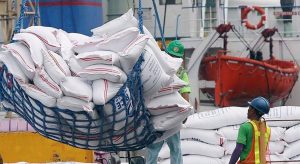THE National Economic and Development Authority (NEDA) said it is working with the Department of Agriculture (DA) on a new tariff adjustment system for rice, following the reduction of rice import tariffs to 15% from 35% until 2028.
“We are actually establishing that threshold, together with DA. We are trying to come up with almost like an automatic adjustment so that we can make the proper representation to the Cabinet, to the President,” NEDA Secretary Arsenio M. Balisacan said at a Senate economic affairs hearing on Tuesday.
On the sidelines of the hearing, he told BusinessWorld that NEDA is drafting the parameters for adjusting tariffs, adding that the process is still in the early stages at a technical team level.
Senator Cynthia A. Villar has called on the DA to more efficiently use the P30 billion in national rice development funds, and called for a halt to the procurement of hybrid seed, which she said is expensive and has failed to boost output.
She filed Senate Bill No. 2601, which seeks to extend the Rice Competitiveness Enhancement Fund to support farm mechanization and the supply of seed, fertilizer and farming know-how.
“What we are trying to do is come up with a set of guidelines, a set of rules that will allow us to say that a threshold has been breached, and then say we need to do something about it… and undertake the proper representation to the Cabinet.”
The RCEF, a component of the Rice Tariffication Law passed in 2019, is set to expire by the end of this year. The law deregulated rice imports, allowing private parties to import rice, originally charging them a 35% tariff on grain brought in from Southeast Asia. The tariff has been lowered to 15% regardless of source country.
The Federation of Free Farmers and Samahang Industriya ng Agrikultura have opposed the lowering of rice tariffs to 15%, saying that such a move threatens farmers’ livelihoods. — John Victor D. Ordoñez
